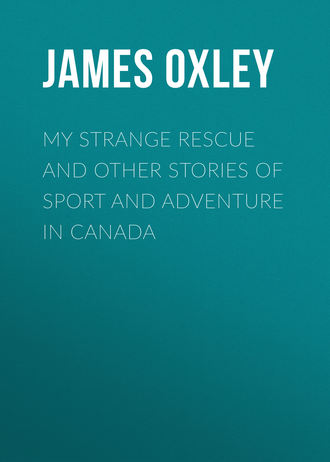 полная версия
полная версияMy Strange Rescue and other stories of Sport and Adventure in Canada
There being not a breath of wind, they had no use for the sail, so the mast was not put up nor the rudder shipped. In his enthusiastic eagerness to realize their long-cherished plan, Lon set to paddling with all his might; but Alec, who had the stern, laughingly checked his ardour, saying, —
"Take it easy, Lon; take it easy, my boy! There's lots of work ahead of you. Better not waste your muscle now!"
Alec had taken care to make inquiries of some of the Britannia folk as to the course he should steer, and they had all impressed upon him to go a good way straight up the lake, and away from the rapids, before turning toward Deschenes, as the current was tremendously strong, and made itself felt far higher up than one would imagine, looking at it from the Britannia side.
Accordingly he pointed the canoe almost due north, as though he had Aylmer in mind rather than Deschenes, and kept her on that course until Lon began to grow impatient.
"What's the use of going up so far?" he protested; "you can't feel the current here."
"Because old Lark told me to make that point before striking across, and he knows all about it," replied Alec.
"Ugh: Lark's an old fuss. He goes away up there only because he's too lazy to pull straight across where the current's strong," grumbled Lon, who had a passion for short cuts, and who kept urging his companion to head the canoe more directly toward their destination, until at last Alec, for very peace's sake, and against his better judgment, altered their course in compliance with his wishes.
For a hundred yards or so the paddling was no harder than before, and they made no leeway, so that Lon could exclaim triumphantly, —
"There now, didn't I tell you? It's only a waste of time going so far up."
But when another hundred yards' advance had brought the canoe fairly into the middle of the mighty stream, moving with majestic flow toward the angry rapids, the paddlers soon awoke to the fact that while they were still making good headway, they were making considerable leeway also, and that the task of getting across was going to be made much harder thereby.
Although both noticed this, neither made any remark about it at first: Alec, because he did not wish to alarm Lon; and Lon, because he shrank from admitting that it would have been wiser to follow shrewd old Lark's advice. So they paddled away in silence, putting plenty of muscle into their strokes, and anxiously measuring their progress by landmarks on the farther shore.
Presently their exertions began to toll upon their young frames. The perspiration beaded their faces, their breath came short, their backs began aching, and their arms grew weary.
Lon's heart was already sinking within him, and Alec deeply regretted having yielded to his companion's ill-advised solicitations to disregard old Lark.
But there was no time for reconsideration or exchanging of regrets. They were beyond a doubt in the grasp of the current, and must strain every nerve to extricate themselves.
Then, to add to their anxiety, the weather showed signs of betraying the fair promise of the morning. Clouds began to obscure the deep blue of the sky, and a breeze to ruffle the calm surface of the lake. Unable to control his feelings any longer, Lon broke out with more than a hint of a sob in his voice, —
"O Alec, I wish we hadn't started! I'm getting awfully tired, and we don't seem to be making any headway at all."
"Oh, yes we are, Lon," responded Alec, doing his best to be cheerful. "Paddle away; we'll get across all right."
Thus encouraged, Lon put a little more life into his strokes for the next few minutes, and the canoe did seem to be gaining ground. But the gain was only temporary. The further they advanced the more they felt the force of the current.
Yet it was too late to turn back. Their only course was to keep on until they had shaken themselves free from the power that was dragging them downward to destruction.
Whether they would have been equal to this feat can only be guessed; for in trying to change his position to relieve his cramped legs, Lon lost his balance for a moment, and on attempting to recover himself did what was even worse – let slip his paddle, which was instantly whirled out of his reach.
"O Alec! what shall we do now?" he cried in dismay.
Alec's face was white and set.
"Nothing – we are powerless," he said quietly.
It was, of course, futile for him to try to contend alone with the pitiless current. The little canoe, as if glad at having no longer to fight its way foot by foot, glided gaily down towards the rapids, and all that Alec could do was to keep it straight in its course, and not allow it to swing around broadside.
Poor Lon, utterly overcome with terror, crouched down in the bow, sobbing so that he shook the frail canoe. But Alec was not one to yield to despair so long as anything could be done.
His brain was busy seeking some scheme for escape from their exceeding peril, and as he glanced anxiously ahead, a thought flashed into his mind that caused his eye to brighten and his pale face to light up with hope and determination.
Right on the edge of the rapids, just before the smooth swift stream broke up into tumultuous billows, stood a little island – a mere patch of rocks, crowned with half-a-dozen straggling trees.
If he could only beach the canoe on this island they might yet be saved. It was all that remained between them and certain death.
The island was not more than two hundred yards distant, and to reach it he must make the canoe cut obliquely through the current. Summoning all his energies for a supreme effort, he bent to his task, in the meantime saying to Lon, —
"Be ready to jump the moment the canoe strikes."
For a boy of his age, Alec put a wonderful degree of strength into his strokes, and he had the joy of seeing his frail craft obey, in spite of the opposing waters, until it was pointing fair for the island. Then with a glad hurrah he ceased fighting the current, and joined forces with it, so successfully as to drive the canoe straight towards the rocks.
He did not miss his aim. With a leap, as though it were alive, the canoe rushed at the island and ran half its length out of the water, a sound of splintering wood telling that its bottom had suffered in so doing.
With feelings of indescribable relief the boys sprang out upon the solid ground, and instantly embracing one another, danced about in sheer exuberance of joy.
The rapids were cheated of their prey, and the worst of the peril was passed.
Having thus given vent to their feelings, they proceeded to examine the canoe, and were glad to find that its bottom was not very badly injured, and could be easily repaired.
Their next thought was, how could they get off the island? They were safe enough there for the present, of course, and they had sufficient provisions, if carefully husbanded, to keep them from starving for three or four days.
But they had no idea of playing the part of Robinson Crusoe and his man Friday, even for that short space of time, if it could possibly be helped. So they got on the edge of the island nearest Britannia, and Alec held up his paddle with his coat on it as a signal of distress, while both shouted at the top of their voices.
Their shouts were drowned in the ceaseless roar of the rapids; but after a while their signal of distress was observed, and soon a crowd had gathered on the shore opposite them, and there was great excitement.
Everybody was eager to help, but nobody knew just what to do. All sorts of schemes were suggested for the rescue of the boys, the most feasible of which was to have a large boat go out above the rapids and anchor there, and then send down a smaller one secured by a rope, with which it could be hauled back again, for no boat could by any possibility be rowed back against that mighty current.
But there were two difficulties in the way of this plan. There was no boat at the village big enough and no rope long enough for the purpose, so some other way must needs be devised.
The morning wore away and the afternoon shadows lengthened without anything being done, and it looked as though the boys would have to stay on the island all night, when the cry was raised that there was a raft coming down; and sure enough the great towing steamer, followed by a huge raft of square timber, hove into sight far up the lake.
The problem of the boys' deliverance need no longer he worried over. The raftsmen would solve it in short measure.
The big raft reached Britannia just long enough before dark to allow of the rescue being accomplished. The moment the foreman heard of the boys' situation he detailed six of his best men, three being Indians and three French Canadians, to bring them off.
Landing their largest bonne, a kind of boat peculiar to lumbering being flat on the bottom and very high at both bow and stern, they rowed off briskly towards the rapids, laughing and chaffing one another, and evidently deeming it quite a bit of fun, while the crowd gathered on the shore watched their every movement with breathless attention.
Managing their clumsy-looking but most seaworthy craft with perfect skill, they made an easy landing on the island, took the boys on board, and then waving their hats to the admiring onlookers, continued gaily on into the very midst of the boiling rapids, the big bonne bobbing about like a cork, seemingly at the entire mercy of the waters, yet all the time being cleverly steered by her crew, and after an exciting passage, during which the boys hardly breathed, shooting out into the smooth stretch below the rapids without having taken so much as a single drop of water on board.
A hearty cheer broke from the delighted spectators at this happy conclusion to the affair, and a few moments later the boys were in their midst, receiving the embraces of their overjoyed parents and the vigorous congratulations of the others.
The rescuing raftsmen were well rewarded for their timely service, and Master Lon learned a lesson in caution that he is not likely soon to forget.
THEO'S TOBOGGANING TRIUMPH
The boys of Bridgetown were all agreed that there had not been such a winter for tobogganing since they could remember; and if they ever thought of the weather-clerk at all, it was with feelings of the deepest gratitude.
In the first place, it began with a frost that made the ground as hard as iron, and the waters were, in Bible language, "hid as with a stone." Then upon this came one fall of snow after the other, until there was nothing left to wish for in that direction, and the hoys were thoroughly content.
Not only was the weather-clerk thus considerate, but nature had already been kind enough to provide them with the finest site for a toboggan slide imaginable. The placid stream which bore the name of Bass River spread out into a broad reach just before it came to their town, and on one side the bank rose up into a steep bluff whose grass-grown face, slanting right down to the water's edge without a break or gully, seemed intended for no other purpose than to afford the boys a splendid coasting-ground when well sheeted with snow. And the boys knew right well how to appreciate their privileges, I can assure you. To go out to Bass River Bluff on a Saturday afternoon was to witness a scene well worth seeing. The hill would fairly swarm with boys and girls enjoying themselves to the top of their bent. From Patsey Kehoe, the washer-woman's ragged urchin, with his curious apology for a sled constructed out of old barrel staves, on which he dared to take only short slides from a little way up the hill, and which he sorely regretted was not big enough to carry him and Katey at the same time, to Ralph Masterton, the eldest son of the rich and haughty judge, with his big toboggan, so finely varnished and comfortably cushioned, that could take four persons down every trip, the young people of the town would turn out and make the valley ring with their laughter and shouting.
One of the most regular attendants at Bass River Bluff was Theo Ross, who, with his widowed mother, lived in a cozy cottage on the opposite side of the river from the town, and consequently was looked upon as one of the country boys, although he came in every day to the high school. There was a good deal of rivalry between the boys of Bridgetown and those who lived in the scattered settlement across the river, which was known as Riverside – a rivalry that led to all sorts of matches, and now and then to fights. No one took more hearty interest in this rivalry than Theo. He was a strong, stout, hardy lad of sixteen, up to anything, as the saying is, and was generally looked upon by the Riverside boys as their leader. One Saturday evening he came home in high spirits.
"Hoop-de-dooden-do!" he shouted, as he burst into the house.
"Why, Theo, what are you so excited about?" inquired his mother, looking up with a glad smile of welcome for the boy that was the joy and pride of her life.
"Excited? Perhaps I am; and no wonder, for aren't we going to have the biggest tobogganing match next Saturday afternoon that you ever heard of!" replied Theo, at the same time giving his mother a hug and a kiss that were a credit to both, for it showed how thoroughly they understood one another.
Mrs. Ross was a wise not less than a loving mother, and one of the proofs of her wisdom was the hearty interest she took in her son's sports as well as in his studies. He had lost his father when but a baby, and she had determined to fill the vacant place to the best of her ability. So from the very first she entered heartily into his amusements, and made herself his companion as far as she could. Theo never played cricket or lacrosse so well as when his mother was looking on, and no applause was sweeter to him than the clapping of her hands. He therefore felt sure of an attentive listener as he proceeded to unfold the cause of his excitement.
"Well, you know, mother, the Bridgetown boys have been boasting all winter about their toboggans, and saying that they can run away from anything in Riverside, and our fellows have been talking back at them, until both sides have begun to feel pretty hot over it. We've had a lot of races, but they didn't settle anything, because sometimes the Bridgetown boys would win and sometimes the Riverside; so this afternoon I proposed to Ralph Masterton that next Saturday afternoon he should bring a team of four tobogganers from the town, and I would bring four from the country, and we'd settle the question without any more talk."
"Well, but, Theo dear, won't it be dangerous for so many as eight to coast down together? You might run into each other," asked Mrs. Ross, rather anxiously.
"O you dear innocent!" laughed Theo, "that's not the way we'll do at all. Only two will go down at a time. You see there will be, first of all, four heats, and we'll draw lots for our places in the heats; then the four winners will run against each other, making two more heats; and then there will be a final heat in which the two winners will run together, and that will decide."
"That seems a very good arrangement," said Mrs. Ross approvingly. "Whose idea was it?"
"Mostly mine, mother. It's the best way to get fair play all round," answered Theo.
"Will you have any difficulty in choosing your team?"
"Oh, not much. Walt Powell and Rob Sands will be on for sure. They have good toboggans, and they can steer splendidly. The fourth chap I'll pick out through the week."
"Well, Theo, you must do your best to win, for I'll be there to watch you."
"You may depend upon it I will, for your sake as much as for the honour of Riverside," replied Theo, giving his mother a loving kiss before he went off to his room for a wash.
It seemed an awfully long week to the excited boys, impatient for the coming contest. Theo had many applicants for a position on his team, and having, after careful deliberation, decided in favour of Fred Fellows, the four boys had many an earnest consultation as to the best way of securing success. On Friday evening the others brought their toboggans over to Mrs. Ross's, and they spent an hour or two in seeing that the bottoms were perfectly smooth, the gut lashings all taut, and the cushions secured beyond the possibility of slipping. They were not a little disturbed at some rumours that had reached them of Ralph Masterton having sent off to the capital and got a new toboggan of a kind just lately patented, which was made differently from the others and reported to be much faster. If this was true, Ralph had done rather a mean thing; for although not expressly stipulated, it was generally understood that the toboggans to be used in the contest were such as they already had, and not new ones imported for the purpose. But, as Theo sensibly said, it was no use worrying until they knew for certain; so, hoping for the best, they parted for the night.
Saturday proved as fine as could be wished, and early in the afternoon a crowd began to gather on Bass River Bluff. Besides the honour of the championship, Judge Masterton had offered a handsome prize to the winner in the shape of a silver cup, and there was no end to the excitement. The judge himself and all his family were present. So, too, were Theo's mother and the parents of the other contestants. So, too, was Patsey Kehoe, holding Katey with one hand and dragging his forlorn little barrel-stave sled with the other. Everybody in Bridgetown and Riverside that could come had come, and the flat top of the bluff was fairly black with spectators.
By three o'clock all the competitors had arrived. When Ralph Masterton appeared, Theo gave one sharp glance at his toboggan, then turned to his companions with his face the picture of indignation.
"It's true, boys, after all; Ralph's got one of those new-fangled affairs I read of in the papers. They say they can go like smoke. He hasn't done the square thing. But we're not beaten yet, for all that!" and Theo looked proudly down at his toboggan, which had won as high a reputation for speed as the owner had for skill.
It took half-an-hour to draw lots for the heats, and then at last all was ready, and Judge Masterton, acting as starter, called out the first pair. Besides the steerer each toboggan was to carry another person for ballast. Fred Fellows was the first of Theo's team to try his fortune. Amid breathless silence and suspense he put his toboggan in position beside his opponent's.
"Are you ready?" asked the judge. They both nodded. "Then – go!" and with half-a-dozen quick steps they pushed their toboggans over the brow of the hill, and flinging themselves on sideways with one leg extended for a rudder, shot down the steep slope like arrows from a bow. For some time they kept side by side. Then Fred was seen to swerve and slew, and the Bridgetown boy to slip ahead. The advantage was not much, but he kept it to the end, and the first heat went against Riverside. The Bridgetown boys cheered lustily, and the Riversiders looked rather glum, until the next heat was run and resulted in a win for the latter, thus making things even. The Riverside entry took the third heat also, and their hopes ran high, but cooled down again when the fourth heat went to Bridgetown.
The result of the first round, accordingly, was that two of each side had won their heats, Theo and Ralph being, of course, among the winners. The excitement grew more and more intense as, after a little breathing-space, the second round was called.
Curiously enough, Theo and Ralph did not come together in this round either, having each another opponent, whom they vanquished easily. As they stood on the hill together at the conclusion of the round, Ralph turned to Theo with a smile which betokened perfect confidence in himself, and pointing to his new toboggan, said, —
"She's a hummer; there's nothing on the bluff to touch her."
"Do you think it was just the square thing, Ralph, to get that toboggan when it was understood we were to race with what we had already?" asked Theo quietly.
"Pooh!" replied Ralph, tossing his head defiantly; "everything's fair in love and war."
As he turned away and swung his toboggan round, it came in contact with Patsey Kehoe's barrel-stave sled. With a muttered oath Ralph sprang toward the obstruction, and kicking it high into the air, the clumsy little thing fell to the ground shattered into useless fragments. Poor Patsey gave a cry as he saw his plaything demolished, but Ralph's angry face silenced him again, and with tears running down their cheeks he and Katey proceeded to gather up the pieces.
"Get ready for the final heat," called out Judge Masterton.
Mrs. Ross pressed forward to Theo's side and whispered in his ear, "Good luck to you, my boy."
With every eye upon them, Ralph and Theo drew their toboggans into position. The difference between the two toboggans was very marked. Theo's was a particularly fine one of the ordinary kind, but Ralph's was made of narrow hard-wood strips secured by screws instead of thongs, and had a sharp racing look that could not be mistaken. Just as the contestants were ready to receive their ballast, Theo's glance fell upon Patsey Kehoe pressing forward eagerly on the edge of the crowd, watching him with his whole soul in his eyes. He knew well how intensely the little fellow hoped for his success, and suddenly an idea flashed into his mind which caused him to call out to Judge Masterton, —
"A minute's time, please, sir."
"All right, my lad," replied the judge.
Then, to the surprise of everybody, Theo, after whispering to Walter Powell, whom he had first intended to be his companion on the toboggan, and who now drew aside, beckoned to Patsey Kehoe. Patsy approached bashfully.
"Jump on in front, Patsey," said Theo briskly. "You're to be my ballast this time."
There was a murmur of astonishment from the crowd as the ragged little chap awkwardly got into his place, and Theo did not miss the contemptuous curl of his opponent's lip, but neither did he fail to catch the pleased, approving look his mother sent him. A moment more and everything was in readiness. The spectators held their breath as the judge, lifting his right hand, asked, —
"Are you ready!" and then bringing it down with a crack into the other, shouted, "Then – go!"
As if shot from a bow the two toboggans leaped over the bluff and went rattling down the smooth slope side by side and head to head. Down – down – they went; Theo and Ralph with iron grip and hard-pressed toe keeping them straight in their course, and Patsey and the other ballast clinging fast to the hand-rail. It was the proudest moment of Patsey's life, and one that he would never forget. Just as the toboggans, still perfectly even, approached the bottom of the declivity where the track ran out on to the bosom of the river, Ralph's struck a slight obstacle, which caused it to swerve and then to slew. With a vicious dig of his toe he tried to bring it round straight again. In his hot haste he overdid it, and the head swung round until the toboggan went broadside to the track, scratching, bumping, cracking, until like a flash it came bang against the side of the slide, pitching its passengers out upon their heads and splitting one of the thin strips clean in two. In the meanwhile Theo and Patsey, amid the cheers of the crowd on the hill, were speeding smoothly over the level ice, winners by nearly a hundred yards.
Great was the delight of the Riverside folk at their champion's victory, and many of the Bridgetownians joined in congratulations too, for Ralph Masterton was far from popular among them. When Theo reached the top of the bluff his mother hastened to him, her face beaming with pleasure as she said, —
"I am very proud of your victory, Theo, but I am prouder still of the heart that prompted you to take Patsey Kehoe."
THE END






